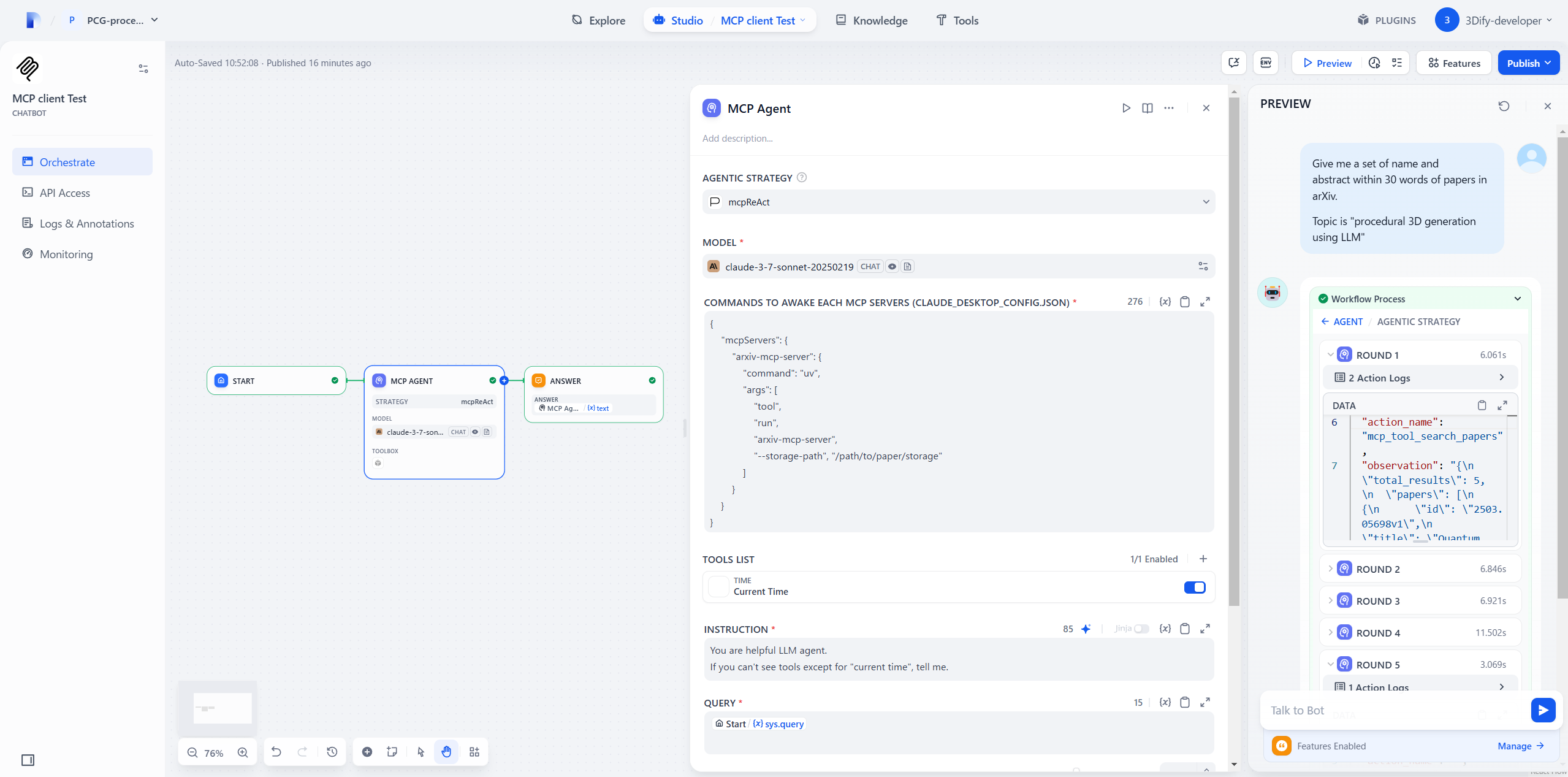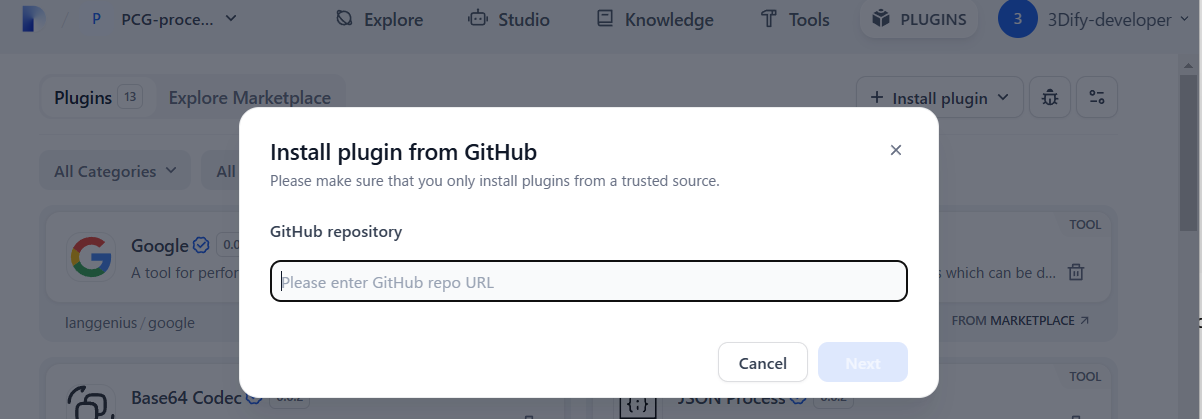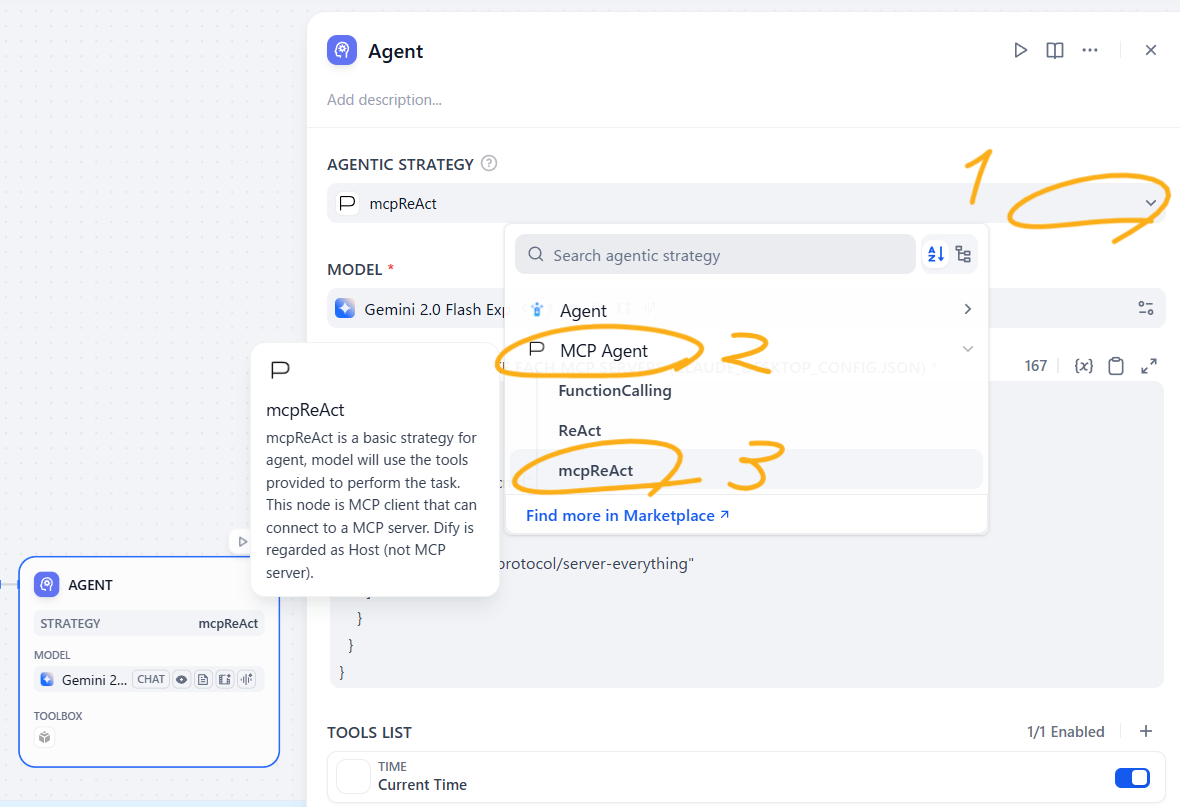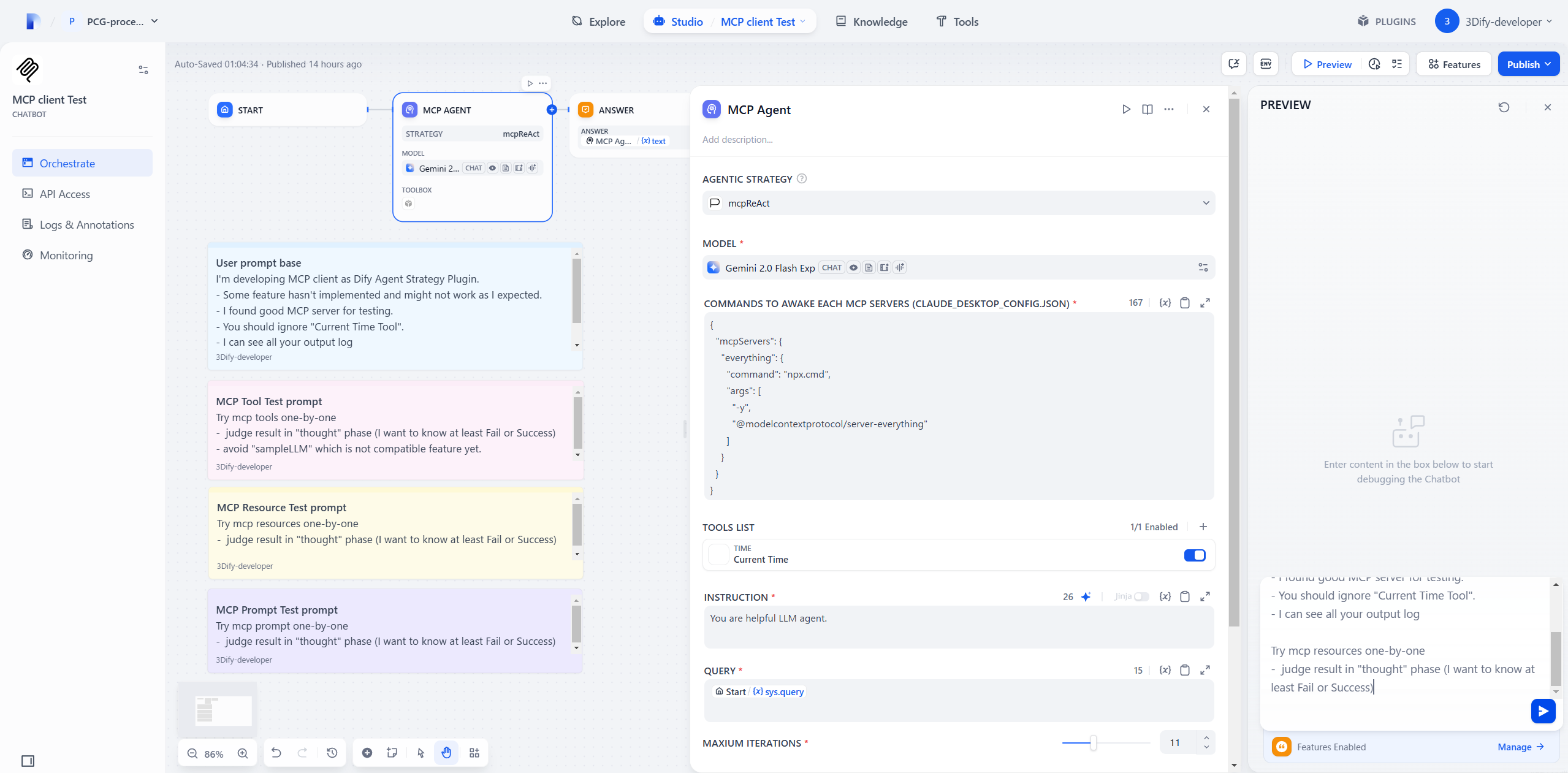- Explore MCP Servers
- dify-mcp-client
Dify Mcp Client
What is Dify Mcp Client
The Dify MCP Client is an agent strategy plugin that integrates with computer systems using the ReAct approach. It connects to MCP servers to provide functionalities such as tool management, resource access, and prompt handling within a structured agent workflow. The plugin enables the use of different LLMs (Large Language Models) to interact with specified tools seamlessly.
Use cases
Dify MCP Client can be utilized for various applications such as GUI automation, handling complex workflows, and integrating different servers through a unified interface. It supports on-demand execution of tasks, making it suitable for scenarios where automated actions are needed based on specific triggers or conditions, including chatbots and interactive agents.
How to use
To use the Dify MCP Client, users must install the plugin via GitHub or a local .difypkg file. After installation, it can be incorporated into Dify workflows by selecting the ‘mcpReAct’ strategy node. Users must provide a configuration JSON to define MCP server connections, allowing the agent to execute tasks and interact with tools or resources.
Key features
Key features include on-demand GUI automation capabilities through UI-TARS integration, customizable lifetime parameters for controlling the duration of GUI actions, support for multiple servers, and a simplified dependency management with reduced library requirements. It also offers efficient memory handling and supports various MCP setups.
Where to use
The Dify MCP Client can be used within the Dify platform, particularly in workflows requiring agent-based interactions. It is ideal for applications in automation, interactive systems, and any scenario where a structured approach to connecting to multiple resources and executing commands is needed, particularly in environments that require Dify’s agent capabilities.
Overview
What is Dify Mcp Client
The Dify MCP Client is an agent strategy plugin that integrates with computer systems using the ReAct approach. It connects to MCP servers to provide functionalities such as tool management, resource access, and prompt handling within a structured agent workflow. The plugin enables the use of different LLMs (Large Language Models) to interact with specified tools seamlessly.
Use cases
Dify MCP Client can be utilized for various applications such as GUI automation, handling complex workflows, and integrating different servers through a unified interface. It supports on-demand execution of tasks, making it suitable for scenarios where automated actions are needed based on specific triggers or conditions, including chatbots and interactive agents.
How to use
To use the Dify MCP Client, users must install the plugin via GitHub or a local .difypkg file. After installation, it can be incorporated into Dify workflows by selecting the ‘mcpReAct’ strategy node. Users must provide a configuration JSON to define MCP server connections, allowing the agent to execute tasks and interact with tools or resources.
Key features
Key features include on-demand GUI automation capabilities through UI-TARS integration, customizable lifetime parameters for controlling the duration of GUI actions, support for multiple servers, and a simplified dependency management with reduced library requirements. It also offers efficient memory handling and supports various MCP setups.
Where to use
The Dify MCP Client can be used within the Dify platform, particularly in workflows requiring agent-based interactions. It is ideal for applications in automation, interactive systems, and any scenario where a structured approach to connecting to multiple resources and executing commands is needed, particularly in environments that require Dify’s agent capabilities.
Content
dify-mcp-client
MCP Client as Agent Strategy Plugin with Computer Using Agent (UI-TARS-SDK) support.
[!IMPORTANT]
Dify is notMCP ServerbutMCP Host.

How it works
Each MCP client (ReAct Agent) node can connect MCP servers.
Tool,Resource,Promptlists are converted into Dify Tools.- Your selected LLM can see their
name,description,argument type - The LLM calls Tools based on the ReAct loop (Reason → Act → Observe).
[!NOTE]
Most of the code in this repository contains the following files.Dify Official Plugins / Agent Strategies
https://github.com/langgenius/dify-official-plugins/tree/main/agent-strategies/cot_agent
✅ What I did
- Copied
ReAct.pyand renamed file asmcpReAct.py - Added
config_jsonGUI input field by editingmcpReAct.yamlandclass mcpReActParams()
in mcpReAct.py, I added
- New 12 functions for MCP
__init__()for initializingAsyncExitStackandevent loop- Some codes in
_handle_invoke_action()for MCP - MCP setup and cleanup in
_invoke()
[!IMPORTANT]
ReAct while loop is as they are
🔄 Update history
- Add SSE MCP client (v0.0.2)
- Support multi SSE servers (v0.0.3)
- Update python module and simplify its dependency (v0.0.4)
- mcp(v1.1.2→v1.6.0+)
- dify_plugin(0.0.1b72→v0.1.0)
- Add UI-TARS SDK integration for GUI automation capabilities (v0.0.5)
- Support Streamable HTTP MCP client
🤖 UI-TARS Integration
This plugin includes UI-TARS SDK integration for GUI automation capabilities.
[!WARNING]
UI-TARS-SDK integration is supported only Dify Plugin’s local debug deployment.
https://github.com/3dify-project/dify-mcp-client#-how-to-develop-and-deploy-pluginNormal difypkg install doesn’t work. Because UI-TARS require OS native API, yet Dify plugin env is Linux docker container.
I’m thinking alternative solusion via Streamable HTTP MCP.
Key Features
- On-demand GUI automation: UI-TARS is called only when needed, reducing token consumption
- Life-time control: Set maximum loop count per task to prevent runaway automation
Known Limitations
- Single Monitor Support: UI-TARS currently recognizes the primary monitor only. Multi-monitor setups are not supported.
- Mac Retina Display Issue: On macOS with Retina displays, UI-TARS requires the display resolution to be set to “Default” instead of the highest quality setting. Otherwise wrong (w,h) point is clicked. https://github.com/bytedance/UI-TARS-desktop/issues/591
Life-time Parameter
The life_time parameter controls the maximum number of GUI actions UI-TARS can perform:
- Default: 10 iterations
- User-configurable maximum via
ui_tars_max_life_time_count - Your selected LLM can dynamically adjust within the user-defined limit based on task complexity
[!NOTE]
Currently hardcoded to use UI-TARS-1.5-7B model for optimal cost-performance balance.
🐳 Docker Deployment with Pre-built Node.js
Building the Docker Image
This pulldown guide is for TypeScript stdio MCP server user
docker build -t dify-mcp-client:latest .
Or use our pre-built image:
# In your docker-compose.yml
services:
plugin-daemon:
image: memedayo/dify-plugin-daemon:latest # with Pre-built Node.js
# ... rest of configuration
Without Node.js in container, you lose TypeScript stdio MCP support.
UI-TARS Configuration
For detailed UI-TARS setup, refer to the UI-TARS Desktop deployment guide.
The plugin automatically configures UI-TARS as a tool within the ReAct loop. You need to provide:
- Hugging Face Inference Endpoint URL
- API Key like (hf_xxxxx)
- (Optional) Adjust
ui_tars_max_life_time_countin agent parameters
⚠️ Caution and Limitation
[!CAUTION]
This plugin does not implement a human-in-the-loop mechanism by default, so connect reliable mcp server only.
To avoid it, decreasemax itereations(default:3) to1, and use this Agent node repeatedly in Chatflow.
However, agent memory is reset by the end of Workflow.
UseConversaton Variableto save history and pass it to QUERY.
Don’t forget to add a phrase such as
“ask for user’s permission when calling tools” in INSTRUCTION.
How to use this plugin
🛜Install the plugin from GitHub
- Enter the following GitHub repository name
https://github.com/3dify-project/dify-mcp-client/
- Dify > PLUGINS > + Install plugin > INSTALL FROM > GitHub

⬇️Install the plugin from .difypkg file
- Go to Releases https://github.com/3dify-project/dify-mcp-client/releases
- Select suitable version of
.difypkg - Dify > PLUGINS > + Install plugin > INSTALL FROM > Local Package File

How to handle errors when installing plugins?
Issue: If you encounter the error message: plugin verification has been enabled, and the plugin you want to install has a bad signature, how to handle the issue?
Solution: Open /docker/.env and change from true to false:
FORCE_VERIFYING_SIGNATURE=false
Run the following commands to restart the Dify service:
cd docker
docker compose down
docker compose up -d
Once this field is added, the Dify platform will allow the installation of all plugins that are not listed (and thus not verified) in the Dify Marketplace.
Where does this plugin show up?
- It takes few minutes to install
- Once installed, you can use it any workflows as Agent node
- Select “mcpReAct” strategy (otherwise no MCP)

Config
MCP Agent Plugin node require config_json like this to command or URL to connect MCP servers
{ "mcpServers":{ "name_of_server1":{ "url": "http://host.docker.internal:8080/sse" }, "name_of_server2":{ "url": "http://host.docker.internal:8008/mcp" } } }
[!WARNING]
- Each server’s port number should be different, like 8080, 8008, …
- If you want to use stdio mcp server, there are 3 ways.
- Convert it to Streamable HTTP mcp server using mcp-proxy https://github.com/sparfenyuk/mcp-proxy?tab=readme-ov-file#1-stdio-to-ssestreamablehttp
- Deploy with source code (NOT by .difypkg or GitHub reposity name install) https://github.com/3dify-project/dify-mcp-client/edit/main/README.md#-how-to-develop-and-deploy-plugin
- Pre-install Node.js inside dify-plugin docker (Only TypeScript stdio server)
Chatflow Example

[!WARNING]
- The Tools field should not be left blank. so select Dify tools like “current time”.
I provide this Dify ChatFlow .yml for testing this plugin.
https://github.com/3dify-project/dify-mcp-client/tree/main/test/chatflow
After download DSL(yml) file, import it in Dify and you can test MCP using “Everything MCP server”
https://github.com/modelcontextprotocol/servers/tree/main/src/everything
How to convert stdio MCP server into Stremable HTTP (or SSE)
option1️⃣: Edit MCP server’s code
If fastMCP server, change like this
if __name__ == "__main__":
- mcp.run(transport="stdio")
+ mcp.run(transport="streamable-http")
option2️⃣: via mcp-proxy
[!WARNING]
Streamable HTTP is recommended instead of deprecated SSE
Following old SSE setup doesn’t work. Read https://github.com/sparfenyuk/mcp-proxy instead.
SSE setup (NOT Streamable HTTP)
\mcp-proxy>uv venv -p 3.12 .venv\Scripts\activate uv tool install mcp-proxy
Check Node.js has installed and npx(.cmd) Path
(Mac/Linux)
which npx
(Windows)
where npx
result
C:\Program Files\nodejs\npx C:\Program Files\nodejs\npx.cmd C:\Users\USER_NAME\AppData\Roaming\npm\npx C:\Users\USER_NAME\AppData\Roaming\npm\npx.cmd
If claude_desktop_config.json is following schema,
{ "mcpServers": { "SERVER_NAME": { "command": CMD_NAME_OR_PATH "args": {VALUE1, VALUE2} } } }
Wake up stdio MCP server by this command
mcp-proxy --sse-port=8080 --pass-environment -- CMD_NAME_OR_PATH --arg1 VALUE1 --arg2 VALUE2 ...
If your OS is Windows, use npx.cmd instead of npx. Following is example command to convert stdio “everything MCP server” to SSE via mcp-proxy.
mcp-proxy --sse-port=8080 --pass-environment -- C:\Program Files\nodejs\npx.cmd --arg1 -y --arg2 @modelcontextprotocol/server-everything
Similarly, on another command line (If you use sample Chatflow for v0.0.3)
pip install mcp-simple-arxiv mcp-proxy --sse-port=8008 --pass-environment -- C:\Users\USER_NAME\AppData\Local\Programs\Python\Python310\python.exe -m -mcp_simple_arxiv
Following is a mcp-proxy setup log.
(mcp_proxy) C:\User\USER_NAME\mcp-proxy>mcp-proxy --sse-port=8080 --pass-environment -- C:\Program Files\nodejs\npx.cmd --arg1 -y --arg2 @modelcontextprotocol/server-everything DEBUG:root:Starting stdio client and SSE server DEBUG:asyncio:Using proactor: IocpProactor DEBUG:mcp.server.lowlevel.server:Initializing server 'example-servers/everything' DEBUG:mcp.server.sse:SseServerTransport initialized with endpoint: /messages/ INFO: Started server process [53104] INFO: Waiting for application startup. INFO: Application startup complete. INFO: Uvicorn running on http://127.0.0.1:8080 (Press CTRL+C to quit)
🔨 How to develop and deploy plugin
Official plugin dev guide
https://github.com/3dify-project/dify-mcp-client/blob/main/GUIDE.md
Dify plugin SDK daemon
If your OS is Windows and CPU is Intel or AMD, you need to download the latest dify-plugin-windows-amd64.exe
Choose your OS-compatible verson here:
https://github.com/langgenius/dify-plugin-daemon/releases
- Rename it as dify.exe for convinence
- mkdir “C\User\user\.local\bin” (Windows) and register it as system path.
- Copy
dify.exeto under dify-mcp-client/
[!TIP]
Following guide is helpful.
https://docs.dify.ai/plugins/quick-start/develop-plugins/initialize-development-tools
Reference
https://docs.dify.ai/plugins/quick-start/develop-plugins/initialize-development-tools
[!NOTE]
You can skip this stage if you pull or download codes of this repodify plugin initInitial settings are as follow
Change directory
cd dify-mcp-client
Install python module
Python3.12+ is compatible. The venv and uv are not necessary, but recommended.
uv venv -p 3.12 .venv\Scripts\activate
Install python modules for plugin development
uv pip install -r requirements.txt
For only UI-TARS-SDK user (after installing Node.js v22 LTS)
npm install
Duplicate env.example and rename one to .env
I changed REMOTE_INSTALL_HOST from debug.dify.ai to localhost
(Docker Compose environment)
click 🪲bug icon button to see these information
Activate Dify plugin
python -m main
(ctrl+C to stop)
[!TIP]
REMOTE_INSTALL_KEY of .env often changes.
If you encounter error messages likehandshake failed, invalid key, renew it.
Package into .difypkg
./dify-mcp-client is my default root name
dify plugin package ./ROOT_OF_YOUR_PROJECT
Useful GitHub repositories for developers
Dify Plugin SDKs
https://github.com/langgenius/dify-plugin-sdks
MCP Python SDK
https://github.com/modelcontextprotocol/python-sdk
[!TIP]
MCP client example
https://github.com/modelcontextprotocol/python-sdk/blob/main/examples/clients/simple-chatbot/mcp_simple_chatbot/main.py
[!NOTE]
Dify plugin hasrequirements.txtwhich automatically installs python modules.
I include latestmcpin it, so you don’t need to download the MCP SDK separately.

